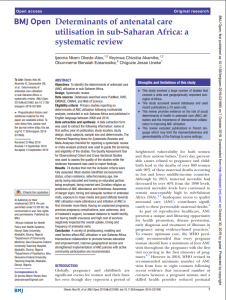
Objectives
To identify the determinants of antenatal care (ANC) utilization in sub-Saharan Africa.
Design
Systematic review.
Data sources
Databases searched were PubMed, OVID, EMBASE, CINAHL and Web of Science.
Eligibility
criteria Primary studies reporting on determinants of ANC utilization following multivariate analysis, conducted in sub-Saharan Africa and published in English language between 2008 and 2018.
Data extraction and synthesis
A data extraction form was used to extract the following information: name of first author, year of publication, study location, study design, study subjects, sample size and determinants. The Preferred Reporting Items for Systematic Reviews and Meta-Analyses checklist for reporting a systematic review or meta-analysis protocol was used to guide the screening and eligibility of the studies. The Quality Assessment Tool for Observational Cohort and Cross-Sectional Studies was used to assess the quality of the studies while the Andersen framework was used to report findings.
Results
74 studies that met the inclusion criteria were fully assessed. Most studies identified socioeconomic status, urban residence, older/increasing age, low parity, being educated and having an educated partner, being employed, being married and Christian religion as predictors of ANC attendance and timeliness. Awareness of danger signs, timing and adequate number of antenatal visits, exposure to mass media and good attitude towards ANC utilization made attendance and initiation of ANC in first trimester more likely. Having an unplanned pregnancy, previous pregnancy complications, poor autonomy, lack of husband’s support, increased distance to health facility, not having health insurance and high cost of services negatively impacted the overall uptake, timing and frequency of antenatal visits.
Conclusion
A variety of predisposing, enabling and need factors affect ANC utilization in sub-Saharan Africa. Intersectoral collaboration to promote female education and empowerment, improve geographical access and strengthened implementation of ANC policies with active community participation are recommended.